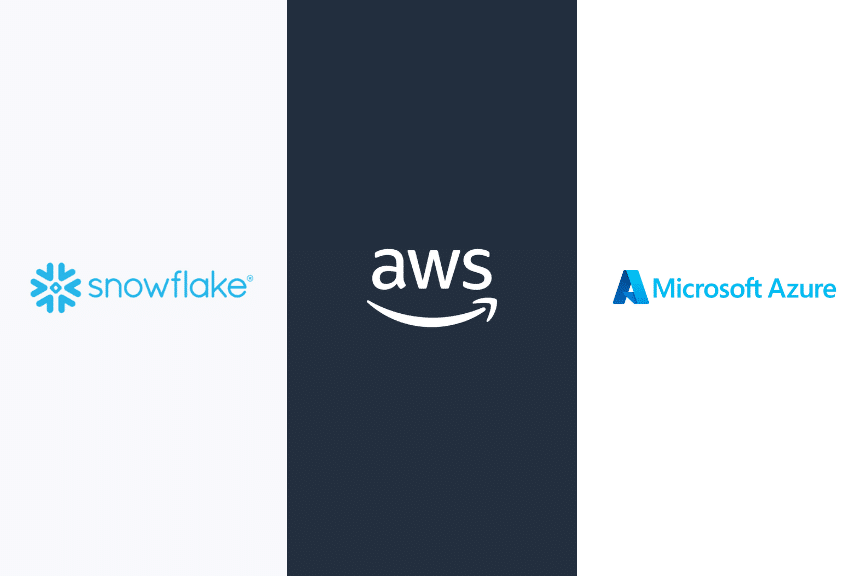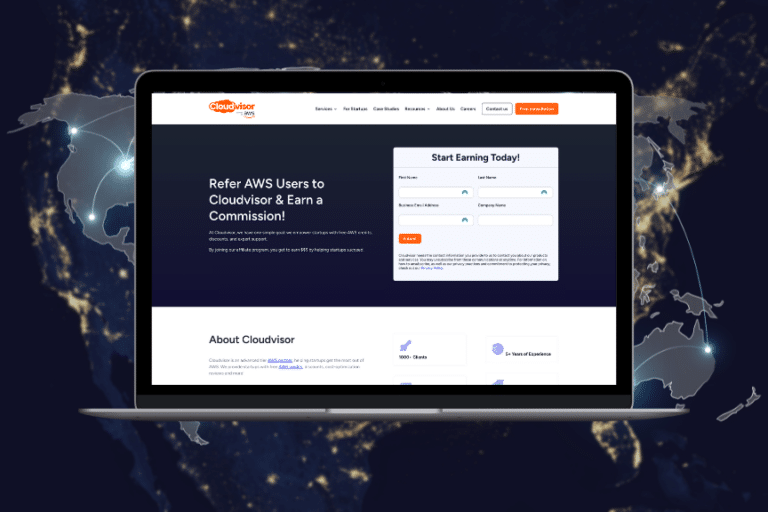Choosing the right cloud platform is critical for any business focused on efficiency and growth. With so many solutions available, it can be a difficult task to sift through the details and nuances of each service. Snowflake, AWS, and Azure stand out as leading contenders in the cloud services arena, each offering distinct advantages depending on your organization’s needs. In this comprehensive guide, we will explore how each platform measures up across various dimensions such as data warehousing, security, scalability, integration capabilities, and cost-effectiveness. By dissecting these key aspects, we aim to equip you with the insights needed to make an informed decision about which cloud solution is the best fit for your business operations.
Table of Contents
Understanding the Basics
Before we delve into the nuances that differentiate these platforms, a solid understanding of what each offers is crucial:
- Amazon Web Services (AWS): Launched in 2006, AWS is a subsidiary of Amazon, providing on-demand cloud computing platforms and APIs to individuals, companies, and governments. AWS is known for its vast service catalog that includes over 200 fully featured services from data centers globally. Services span across computing, storage, databases, analytics, networking, mobile, developer tools, management tools, IoT, security, and enterprise applications. This diversity allows AWS to offer infrastructure-as-a-service (IaaS), platform-as-a-service (PaaS), and packaged software-as-a-service (SaaS) solutions. AWS is widely recognized for its scalability, reliability, and innovative approach to introducing new technologies that cater to a broad range of industries.
- Microsoft Azure: Introduced in 2010, Microsoft Azure is the tech giant’s cloud computing service for building, testing, deploying, and managing applications and services through Microsoft-managed data centers. It provides software as a service (SaaS), platform as a service (PaaS), and infrastructure as a service (IaaS) and supports many different programming languages, tools, and frameworks, including both Microsoft-specific and third-party software and systems. Azure stands out for its strong integration with Microsoft’s software products, like Windows and Office, and also offers specific solutions for different industries such as e-commerce, finance, and healthcare. Its offerings are particularly attractive to businesses that are already heavily invested in Microsoft’s ecosystem.
- Snowflake: Snowflake offers a cloud-based data warehousing service that stands apart for its unique architecture and approach to handling data. Unlike traditional database solutions, Snowflake provides a data warehouse that is faster, easier to use, and far more flexible than traditional data warehouse offerings. Snowflake’s architecture allows for storage and computing to scale independently, so customers can use and pay for storage and computation separately. It is built on a patented new SQL database engine with a unique architecture designed for the cloud. Snowflake enables data sharing among its users without copying or transferring data, providing a powerful solution for data-driven enterprises that need real-time access to data.
Multi-cloud Support and Special Features:
- AWS supports hybrid cloud architectures, allowing businesses to blend their on-premises infrastructure with the cloud. AWS’s elasticity and array of services make it ideal for enterprises that need broad functionality alongside their cloud solutions.
- Azure also offers strong hybrid cloud capabilities, which is a significant advantage for organizations looking to integrate their on-premises infrastructure with the cloud seamlessly. Azure’s strength in enterprise environments, especially those that require extensive integration with other Microsoft services, makes it a favored option among current Microsoft users.
- Snowflake is uniquely positioned in that it runs on multiple clouds (AWS, Azure, and Google Cloud Platform) and provides a unified experience across these platforms. This allows organizations to operate multi-cloud strategies effectively, avoiding vendor lock-in and leveraging the best capabilities of each cloud provider.
Understanding these fundamentals is key to discerning which platform will best meet the specific needs of your business, especially when considering the deployment of critical applications and services in the cloud.
Comparison: At A Glance: Snowflake vs AWS vs Azure
| Feature | Amazon | Snowflake | Azure |
| Architecture | AWS uses the shared-nothing MPP architecture. | The Snowflake architecture combines the traditional shared disk with the shared-nothing database architectures. | Azure Synapse uses a scale-out architecture that separates computing from storage. |
| Performance | AWS offers a fine performance on most data types, but the performance is low when dealing with semi-structured data such as JSON files. | Snowflake separates compute from storage, which makes it allow for concurrent workloads, letting users run multiple queries at a time. | It allows for concurrent query processing, helping users to extract insights from their data and visualize it faster. |
| Integrations | AWS supports integration with the entire AWS ecosystem and many other platforms. | Snowflake offers native connectivity to multiple BI, data integration, and analytics tools. | Azure comes with integration tools such as logic apps, API Management, Service Bus, and Event Grid for connecting to third-party services. |
| Security | Both the user and AWS are responsible for securing data. | Snowflake complies with many data protection standards and has implemented controlled access management and data security by encrypting all data and files. | Azure uses access management, information security, threat protection, network security, and data protection for data security. It also has over 90 compliance certificates. |
| Data Backup and Recovery | AWS uses both manual and automated snapshots for data backup and recovery. | Snowflake uses a fail-safe approach rather than a backup, which recovers lost data within 7 days. | Microsoft uses the built-in Azure Backup feature to back up and restore data resources. |
| Suitable For | AWS is suitable for businesses dealing with large-scale data and where queries need a quick response. | Snowflake is good for companies looking for an easy-to-deploy data warehouse solution with nearly unlimited automatic scaling and high performance. | Azure Synapse is good for any company looking for a data warehouse with a great price/performance ratio. |
| Price | AWS offers on-demand and managed storage pricing approaches. | Snowflake offers tiered, pre-purchase, and on-demand pricing plans. | Azure Synapse divides pricing into computing charges and storage charges. |
| Customer Support | To contact the AWS support team, fill out a form on the official AWS website. They will reply via phone or email. | You can contact the Snowflake team by filling a form on their website and they will respond via phone or email. | You can create a support request on their official website, tweet them, or connect with community support. |
Feature Comparison
Data Warehousing and Analytics
- Snowflake: Snowflake’s architecture separates computing from storage, enabling businesses to scale up or down without downtime. It excels in handling large-scale data warehousing operations due to its ability to process queries rapidly and support high concurrency.
- AWS: Amazon Redshift is AWS’s data warehousing solution. It integrates well with other AWS services but typically requires more manual management of scaling compute resources.
- Azure: Azure Synapse Analytics, formerly SQL Data Warehouse, provides data warehousing services that integrate deeply with other Azure services. Like Snowflake, it allows for the separation of compute and storage resources.
Security
- Snowflake: Offers always-on, enterprise-grade security that is automatically applied. It handles encryption across all network communications and at rest.
- AWS: Provides robust security features that can be tailored extensively. AWS also places significant emphasis on compliance certifications.
- Azure: Also focuses heavily on security and compliance, offering many of the same certifications as AWS. Azure often appeals to enterprises because of its seamless integration with other Microsoft security tools.
Scalability
- Snowflake: Exceptional at scaling seamlessly without the need for redistribution of data or complex reconfigurations.
- AWS: Offers a range of tools and services that support scalability, although it sometimes requires manual intervention for optimal scaling.
- Azure: Provides good scalability options, but similar to AWS, can require some manual scaling strategies depending on the service used.
Integration and Ecosystem
- Snowflake: Integrates well with various data integration tools and business intelligence software. Its compatibility with AWS and Azure makes it a flexible option for multi-cloud strategies.
- AWS: Has a massive ecosystem with a broad range of integrated services and third-party apps. Its maturity provides a significant advantage in terms of integrations and tool availability.
- Azure: Highly integrated with Microsoft tools and services, which is particularly beneficial for companies that rely on Microsoft products and services.
Pricing
- Snowflake: Uses a unique pricing model that charges separately for compute usage and storage, which can be cost-effective depending on the workload patterns.
- AWS: Offers a pay-as-you-go model that can be cost-effective but may become expensive without proper cost management strategies.
- Azure: Also uses a pay-as-you-go pricing model, with options for reserved capacity pricing which can offer cost savings over time.
Conclusion
Choosing between Snowflake, AWS, and Azure hinges on your specific business needs. Snowflake excels in data warehousing, making it ideal for companies focused on big data. Azure integrates seamlessly with Microsoft products, benefiting businesses embedded in the Microsoft ecosystem. However, AWS stands out with its comprehensive array of services, including computing, storage, and networking, coupled with its leadership in new technologies like AI and IoT. Its broad functionality and global reach make it an excellent choice for businesses looking to leverage a full spectrum of cloud services to drive growth and innovation. Carefully assess how each platform aligns with your strategic goals to make the most informed decision.






